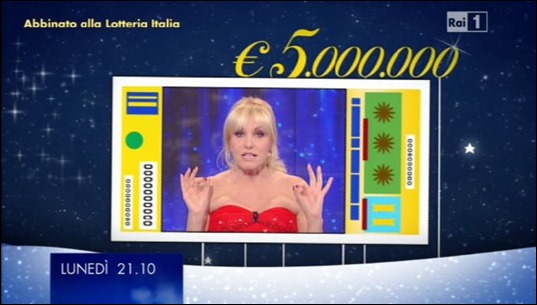La sera del 6 gennaio, giorno dell’Epifania, è stato estratto il biglietto vincente della Lotteria Italia per il valore di 5 milioni di Euro! Il biglietto milionario era stato venduto in una tabaccheria di Lecco, in Lombardia. Siccome ho un amico, Giuseppe, che abita a Lecco, gli ho scritto su Facebook facendogli gli auguri per l’Anno Nuovo, e chiedendogli se per caso fosse lui il fortunato vincitore della lotteria. Questa è stata la simpatica risposta di Giuseppe:
 |
|
Pubblicità della Lotteria Italia 2014
|
On the evening of the 6th of January, the Epiphany, the winning ticket of the Italian Lottery was drawn, its value was 5 millions Euros! The multi millionaire ticket had been sold at a tobacconist’s in Lecco, Lombardy (north of Italy). Since I have a friend, Giuseppe, who lives in Lecco, I sent him a message on Facebook wishing him a Happy New Year, and asking if he happened to be the lucky lottery winner. This is Giuseppe’s nice replay:
Grazie per il messaggio. Purtroppo no, non sono il fortunato. Sarei alle Bahamas, se avessi vinto. Mi viene in mente la storiella del devoto napoletano che prega: "Sant’Anto’, famme vince il primo premio della lotteria…" Appare Sant’Antonio: "Figliolo, io una mano te la do, ma tu almeno compra il biglietto!". Quindi non avendo comprato nemmeno un biglietto, ci sarebbe voluto un doppio miracolo per vincere. Ciao
Thank you for the message. Unfortunately no, I’m not the lucky one. I’d be in the Bahamas, if I’d won. This reminds me of the story of the pious Neapolitan who prays: “Sant’Anto’, let me win the first prize in the lottery …” Sant’Antonio appears: “My son, I’d give you a hand, but you should at least buy the ticket!”. Therefore, not having bought even a single ticket, he would have needed a double miracle on order to win. Ciao
 |
| Sant’Antonio, a typical tacky santino (holy picture) |
P.S. Il Sant’Antonio della storiella è Sant’Antonio da Padova, in realtà un frate Portoghese, che morì a Padova nel 1231 e le sue reliquie sono conservate nella magnifica basilica omonima. Sant’Antonio è ritenuto il santo più invocato perché nella tradizione popolare è considerato il santo delle cose perdute e il santo dei miracoli, poiché può ottenere 13 miracoli quotidiani.
P.S. The Sant’Antonio in the story is Saint Anthony of Padua, in reality a Portuguese friar who died in Padua in 1231, and whose remains are preserved in the magnificent basilica of the same name. Saint Anthony is believed to be the most frequently invoked saint because, according to popular belief, he is considered the saint of lost things and of miracles because he can grant 13 miracles a day!







Leave a comment: